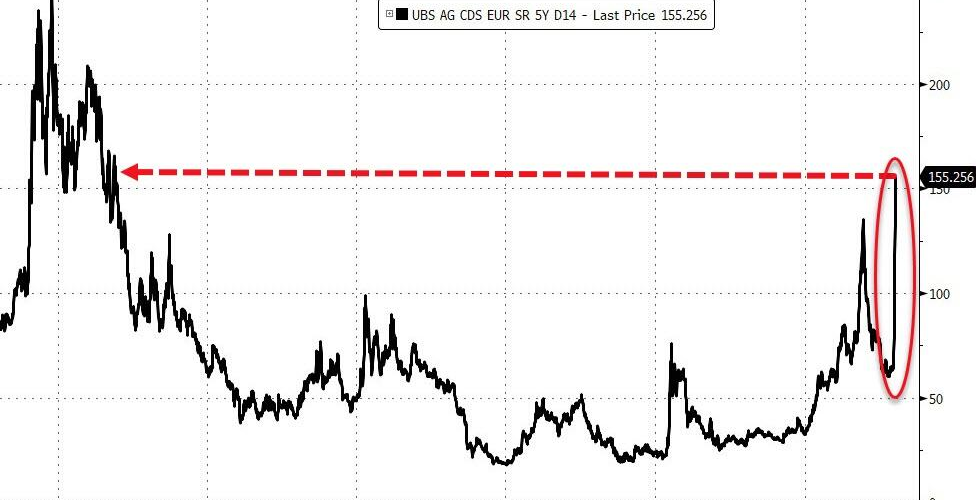After Credit Suisse was gifted $54 billion in liquidity from the Swiss National Bank as a bailout – one of the largest in history thus far – it simply was still not enough to keep the bank functional. Last night the largest European bank was bought up for pennies (metaphorically speaking) by their rival UBS, begrudgingly at that, in order to keep the national and Western economies operating.
The following report is by CNBC:
UBS agreed to buy its embattled rival Credit Suisse for 3 billion Swiss francs ($3.2 billion) Sunday, with Swiss regulators playing a key part in the deal as governments looked to stem a contagion threatening the global banking system.
“With the takeover of Credit Suisse by UBS, a solution has been found to secure financial stability and protect the Swiss economy in this exceptional situation,” read a statement from the Swiss National Bank, which noted the central bank worked with the Swiss government and the Swiss Financial Market Supervisory Authority to bring about the combination of the country’s two largest banks.
The terms of the deal will see Credit Suisse shareholders receive 1 UBS share for every 22.48 Credit Suisse shares they hold.
This acquisition is attractive for UBS shareholders but, let us be clear, as far as Credit Suisse is concerned, this is an emergency rescue. We have structured a transaction which will preserve the value left in the business while limiting our downside exposure.
UBS Chairman Colm Kelleher in a statement, said
The combined bank will have $5 trillion of invested assets, according to UBS.
We are committed to making this deal a great success. There are no options in this. This is absolutely essential to the financial structure of Switzerland and … to global finance.
Kelleher said when asked during the press conference if the bank could back out of the deal.
The Swiss National Bank pledged a loan of up to 100 billion Swiss francs ($108 billion) to support the takeover. The Swiss government also granted a guarantee to assume losses up to 9 billion Swiss francs from certain assets over a preset threshold “in order to reduce any risks for UBS,” said a separate government statement.
This is a commercial solution and not a bailout.
Karin Keller-Sutter, the Swiss finance minister, in a press conference Sunday, said
The UBS deal was scrambled together before markets reopened for trading Monday after Credit Suisse shares logged their worst weekly decline since the onset of the coronavirus pandemic. The losses came despite a new loan of up to 50 billion Swiss francs ($54 billion) granted from the Swiss central bank last week, in an effort to halt the slide and restore confidence in the bank.
News of the deal was welcomed by Treasury Secretary Janet Yellen and Federal Reserve Chair Jerome Powell in a statement. “The capital and liquidity positions of the U.S. banking system are strong, and the U.S. financial system is resilient. We have been in close contact with our international counterparts to support their implementation,” they said.
Credit Suisse had already been battling a string of losses and scandals, and in the last two weeks, sentiment was rocked again as banks in the U.S. reeled from the collapse of Silicon Valley Bank and Signature Bank.
U.S. regulators’ backstop of uninsured deposits in the failed banks and the creation of a new funding facility for troubled financial institutions failed to stem the shock and is threatening to envelop more banks both in the U.S. and abroad.
Credit Suisse Chairman Axel Lehmann said in the press conference that the financial instability brought about by the collapsed U.S. regional banks hit the bank at the wrong time.
Despite regulators’ involvement in the pairing, the deal gives UBS autonomy to run the acquired assets as it sees fit, which could mean significant job cuts, sources told CNBC’s David Faber.
Credit Suisse’s scale and potential impact on the global economy is much greater than U.S. regional banks, which pressured Swiss regulators to find a way to bring the country’s two largest financial institutions together. Credit Suisse’s balance sheet is around twice the size of Lehman Brothers’ when it collapsed, at around 530 billion Swiss francs as of the end of 2022. It is also far more globally interconnected, with multiple international subsidiaries — making an orderly management of Credit Suisse’s situation even more important.
Bringing the two rivals together was not without its struggles, but pressure to stave off a systemic crisis won out in the end. UBS initially offered to buy Credit Suisse for around $1 billion Sunday, according to multiple media reports. Credit Suisse reportedly balked at the offer, arguing it was too low and would hurt shareholders and employees, people with knowledge of the matter told Bloomberg.
By Sunday afternoon, UBS was in talks to buy the bank for “substantially” more than 1 billion Swiss francs, sources told CNBC’s Faber. He said the price of the deal increased throughout the day’s negotiations.
Credit Suisse lost around 38% of its deposits in the fourth quarter of 2022 and revealed in its delayed annual report early last week that outflows have still yet to reverse. It reported a full-year net loss of 7.3 billion Swiss francs for 2022 and expects a further “substantial” loss in 2023.
The bank had previously announced a massive strategic overhaul in a bid to address these chronic issues, with current CEO and Credit Suisse veteran Ulrich Koerner taking over in July.
AUTHOR COMMENTARY
“This is a commercial solution and not a bailout.” -This is just legal rhetoric. Make no mistake: this IS a bailout if there ever was one.
Again, we are seeing a consolidation of power and wealth. More banks are going to get absorbed, big and small in the days, weeks, and months ahead.
The rich ruleth over the poor, and the borrower is servant to the lender.
Proverbs 22:7
For more details on this you can read ZeroHedge’s report on this as well.
You can see Economic Ninja’s commentary on this as well.
Also, take note of this chart:

This shows the current rate and spikes of credit default swaps going on right now. Right now they have returned to similar levels to that of 2011 and 2012, when the European banks started to feel the crunch after the tsunami wave of America’s housing collapse happened. So this just shows the situation we are in, and it would not be surprising, as Ninja explained his report, that spikes back up even higher later this year just like in 2011.
[7] Who goeth a warfare any time at his own charges? who planteth a vineyard, and eateth not of the fruit thereof? or who feedeth a flock, and eateth not of the milk of the flock? [8] Say I these things as a man? or saith not the law the same also? [9] For it is written in the law of Moses, Thou shalt not muzzle the mouth of the ox that treadeth out the corn. Doth God take care for oxen? [10] Or saith he it altogether for our sakes? For our sakes, no doubt, this is written: that he that ploweth should plow in hope; and that he that thresheth in hope should be partaker of his hope. (1 Corinthians 9:7-10).
The WinePress needs your support! If God has laid it on your heart to want to contribute, please prayerfully consider donating to this ministry. If you cannot gift a monetary donation, then please donate your fervent prayers to keep this ministry going! Thank you and may God bless you.







